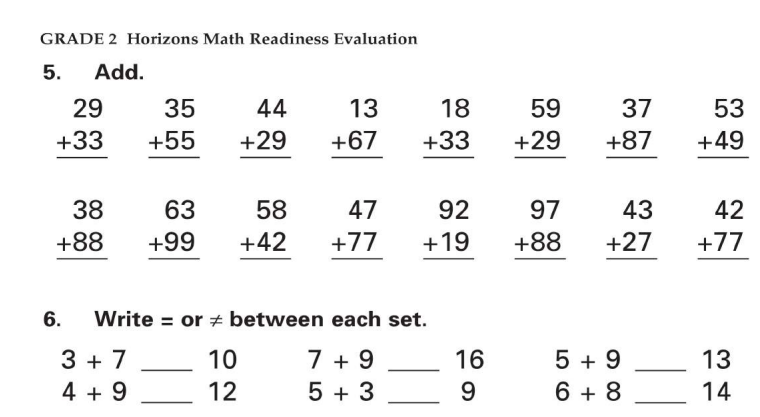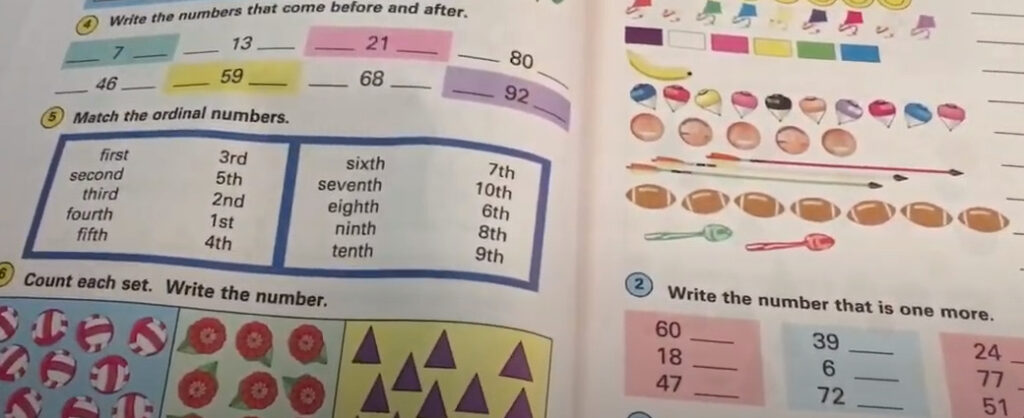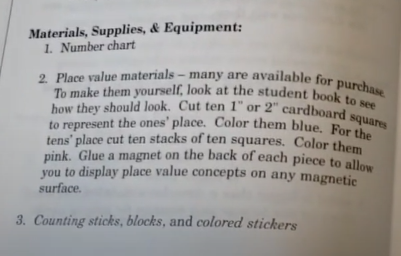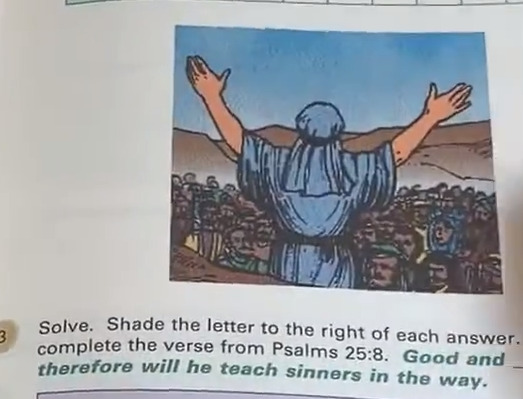
Affordable, multisensory and with a strong emphasis on math facts, review and practice, Horizons Math can give students a strong base of math skills that can help them learn to solve math quickly and accurately.
If you’re looking for a rigorous, traditional math program that’s easy to teach and integrates a Christian worldview, Horizons Math might be the right choice for your family.
What We Like
But watch out for…
What is Horizons Math
Produced by Alpha Omega Publications, Horizons Math is a Christian homeschool math curriculum designed for kindergarten and early grade school students.
The program places a strong emphasis on traditional instruction and review, using incremental skill development, thorough practice and an assortment of hands-on, multisensory learning activities to help students develop strong math skills.
What Ages Or Grades Is Horizons Math Intended For?
Horizons Math is a curriculum intended for students in grades K-8, producing books that cover essential math all the way to Algebra 1.
The series’ books are divided by grade level, which makes understanding their organization a little more straightforward to curricula that assign letters or names to their levels – Horizons Math 1 is intended for Grade 1, Math 2 is Grade 2, Math 3 is Grade 3 and so on.
As Horizons Math is designed as a homeschool program it can, of course, be used by those studying outside the suggested grade levels, such as by precocious learners and those who are a bit behind in their math.
The only thing parents should be careful with is, because the books covers do make obvious reference to grade level, some students may feel awkward or embarrassed about using them if they are above or below the intended grade level.
It is also important to note that Horizons Math is not common core aligned.
The program follows its own pace, scope and sequence and is a little more rigorous, introducing math topics and concepts a little earlier than common core programs.
While this can provide a solid math education for kids, it can also mean that, as with many other homeschool math programs, parents switching into the program can have a harder time figuring out where to start.
Fortunately, Horizons Math provides ready placement tests (which they call Readiness Evaluations) for each level.
These are printable PDFs that contain a few straightforward math questions (10-15) to determine if a student has the necessary skills required to start a particular level.

Overall, these placement tests are fairly easy to administer, as the company provides a separate answer key for each, and they are fairly short, taking between 30-60 minutes or so to administer at even the higher levels, so they’re not too hard on students either.
The answer keys also provide a suggested score that students should achieve to be considered ready for any level (around 70%), which makes the process a little more precise and means that parents won’t have to rely as much on their own judgment when starting a level, something that is helpful for those new to homeschooling or those uncertain of their own math skills.
What Is Required To Teach The Program?
With Horizons Math, parents need a couple things- a Teacher’s Guide, two Student Workbooks and some manipulatives.
The Teacher’s Guide is printed in black and white and contains everything needed to teach the curriculum.
It includes step-by-step lesson plans, as well as several handy and fairly comprehensive charts outlining how and when to use the program’s worksheets, manipulatives and more.
The Teacher’s Guide also includes supplemental worksheets that can be used for further review and practice after every fourth lesson or so, as well as quarterly tests and a final exam.
The Student Workbooks, on the other hand, are full color and use lots of illustrations, which is helpful since students will be spending some time looking at them, and contain perforated pages so parents can remove pages to let students work on them more easily on their own.
The Workbooks look much like a typical math workbook, with an assortment of drill sets, illustrated practice problems and tests sprinkled throughout, but don’t contain a lot of instruction for the student.

This is by design as the program’s worksheets are intended to be used alongside the Teacher’s Guide and overseen by the parent, with instruction, guidance and worksheet pacing laid out fully in the lesson plans.
Horizons Math is a hands-on math program and so does make use of a variety of manipulatives in its lessons. Although the specifics can vary depending on grade, these typically include fairly common items such as:
- Metric and imperial rulers
- Flash cards
- Instructional clock
- Place value manipulatives
- Number charts
- Money
- Calendars
- And more
Unlike many other hands-on math programs, these aren’t included or sold with the program.
Although there are a few retailers that offer pre-made manipulatives kits for the program’s levels, which can save some time and effort on the part of parents, most of the required items are pretty commonly available online.
This means that parents are free to find the required manipulatives on Amazon or other websites, which (with a little clever shopping) can lower the overall cost of the program substantially.
One thing we really liked about Horizons Math is that, from time to time, the Teacher’s Guide will offer tips on how to make various manipulatives at home with common household items, something that can really help homeschoolers on a budget.

How Does Horizons Math Approach Math?
Spiral Curriculum
Horizons Math is a spiral curriculum.
This means that it breaks down math topics into chunks and then teaches them a little at a time, revisiting them later in greater depth throughout the course.
This means that with Horizons Math students will spend some time working with a concept, move on to another concept and then review and revisit the first in greater detail later.
For example, a concept will be introduced in one lesson. Over the next few lessons it will be reviewed and practiced alongside new learning (Primary Practice), and then will pop up again every couple weeks (Secondary Practice).
Students will then have a break where the concept does not appear, which is then followed by more review.
Each book in Horizons Math does a pretty good job at laying out the concepts it covers, as well as its particular spiral, as can be seen in their chart below.

This is in contrast to a mastery approach, where students spend a lot longer on a single concept and explore it completely and to a degree of proficiency before moving on and not really revisiting it again.
As a spiral program, this means that Horizons Math can be a lot less overwhelming for some students compared to a mastery program, as they study concepts a little at a time and rotate through new topics periodically, with complexity and difficulty of math increasing more incrementally.
It also means that students will review previously learned concepts more frequently throughout the year, which is good for those students who have a tendency to what they’ve learned over time without consistent practice.
Traditional Approach
Horizons Math takes a more traditional approach to math that emphasizes teaching students the how of math – that is, how to solve math problems quickly and accurately.
To do so, the program takes a systematic and practical approach to teaching math, with students learning and working with math formulas, doing plenty of practice and review and generally learning procedures that they can use to solve problems in an organized and step by step manner.
This is as opposed to conceptual math curricula, which spend more time exploring math concepts, i.e. helping students understand why math works the way it does rather than how to do it, as well as exploring different approaches and strategies for problem solving.
Consequently, Horizons Math can be said to be something of a back to basics program that should be familiar to the way many parents themselves learned math, and because it is fairly familiar it doesn’t really require much of a learning curve for parents to teach.
Parents and students will spend time learning math facts with flash cards and charts, and perform a good deal of computational exercises and drills in the workbooks, which can result in students developing a strong ability to solve fairly complex calculations quickly and correctly, ultimately developing what is called math fluency.

This procedural approach actually addresses one of the main concerns that parents have with conceptual programs, where a greater emphasis on understanding math theory and ideas can come at the cost of dedicated practice, review and skill building, leading to problems when students are confronted with timed tests and computational assessments.
On the downside, a practical approach does mean that Horizons Math, while it does contain word problems and problems solving throughout the course, may not focus as much on them as a conceptual program might.
Hands-on learning
Perhaps unusually for a traditional and procedural math program, Horizons Math uses a variety of hands-on activities and manipulatives.
During a lesson, for example, parents may introduce and demonstrate concepts by:
- Counting using a number chart or counting sticks
- Exploring ordinal numbers with a calendar
- Working with play money
- Dividing plastic counters
- Doing some flash card activities
- And so on
Interestingly, all grades in the program weave manipulatives and hands-on activities into their lessons to help introduce and explore abstract math concepts.
The use of manipulatives does decrease a little in the older grade levels as the students capacity for abstract and mathematical thinking increases, but they are still included in the lessons to some degree.
This sets it apart from many of its closest competitors, such as Saxon, which only use direct hands-on work for earlier grades.
This hands-on learning makes Horizons Math more multisensory in nature, adding kinesthetic and tactile activities to its auditory (listening) and visual (watching and reading) to instruction, which can be more helpful and engaging for tactile learners.
Christian
Perhaps unsurprisingly, as it is produced by Alpha Omega Publications, Horizons Math is a Christian homeschool math curriculum.
As a result, there are an assortment of maxims, biblical quotes, psalms and inspirational messages woven into each lesson, which the program encourages parents to discuss with their students.

The Student Workbooks may also make references to the bible and biblical stories as part of their practice, as well.

As a result of combining a strong math program with a Christian worldview, Horizons Math can easily integrate into a Christian faith-based homeschool.
Those favoring a faith-neutral curriculum may not appreciate the course’s integration of direct Christian teachings, but it is important to note that they are optional at the end of the day and can be worked around if truly necessary.
How Does It Work And What Are Lessons Like?
Horizon Math’s lessons are pretty straightforward, overall.
Depending on the grade level, Horizons Math books contain about 160-180 lessons, meaning they cover about 36 weeks of teaching on a 5 day a week schedule.
The program is designed to be parent-led, with parents following the included lesson plans that neatly lay out each lesson’s concepts, objectives and materials required.
Parents work through each lesson’s instructions to teach math concepts, engaging in several interactive, hands-on activities along the way to demonstrate and explain abstract concepts and/or hone particular skills.

Each lesson contains about 4-5 of these activities, and they typically involve one new concept and reviewing and several activities that practice previously learned concepts as part of the spiral approach.
Some activities involve direct parent-student interaction, such as by demonstrating a concept on a table using manipulatives or discussing math concepts in more detail, while others are highlighted as Student Activities and are done with the help of the Student Workbooks.
Interestingly, the Student Activities are numbered (One, Two, Three, etc.) and their numbers correspond to those found in the relevant lesson of the Student Workbook, which makes it a lot easier to find everything during a lesson and keep everyone on the same page.
As the series progresses and gets into higher grade levels, the activities in each lesson do involve more independent work, which is nice, with parents shifting towards more of an administrative and oversight role, teaching the material but then allowing the student to work through activities themselves with their workbook.
Following the activities portion of the lesson, there is a section for worksheets, which are located in the Teacher’s Guide (or sold separately), which provide students with the opportunity to practice what they’ve learned and reinforce the learning.
Finally, Horizons Math does offer a quiz that parents can give every 10 lessons, as well as quarterly tests and a final exam.
Overall, Horizons Math lessons are pretty logically laid out and easy to follow for both parents and students.
They are pretty interactive and engaging, using a combination of dialogue, demonstration, hands-on activities and the very visual workbooks to help students better grasp some of the more abstract concepts and ideas in math.
The lessons are also pretty short, usually taking less than an hour to complete depending on the student and grade, and there is a fair amount of variation in the exercises included in each lesson (thanks to the spiral approach), so students are less likely to become bored working on the same math concept over and over again.
Something parents should note is that, as it is something of a traditional curriculum, there is a strong emphasis on math facts to Horizons Math, so lessons do frequently involve drill, usually with flashcards.
Although this does help quite a bit in developing math skill fluency and speed, it usually isn’t every child’s favorite part of math and can feel repetitive, frustrating some students.
Finally, as Horizons Math does involve hands-on lessons, demonstrations and activities, there is some prep time required.
We feel that parents should probably read ahead before each lesson in order to properly gather (or construct) the materials needed and make sure they are ready for use.
How Easy Is Horizons Math To Teach?
Overall, we feel Horizons Math does a good job at balancing ease of use with teaching flexibility.
Its lessons are scripted and do a pretty good job at guiding parents through teaching math concepts, providing a lot of tips on how to best introduce certain ideas, things to look out for with students, ways to troubleshoot certain problems and even ways of making the lessons more interactive and fun for students.
Parents should note, however, that it is not really a fully scripted curriculum, at least not in the traditional sense.
While Horizons Math does a good job at providing step by step guidance through each lesson, there is, for example, no real dialogues or ready word-for-word scripts that can be used by parents if they find themselves at a loss for words.
While this does make it a little trickier for those new to teaching and homeschooling compared to a curriculum with a ready and complete lesson script, we feel it does add a fair amount of flexibility to the program.
While Horizons Math provides a good, step by step idea of how to teach a particular concept, we also feel it leaves enough room that parents can easily integrate their own style and method of teaching should they wish.
Where fully scripted programs can sometimes feel robotic or stilted, parents can use their own way of speaking and explaining things to their child, which can make things feel a lot more natural.
It also creates a ready opening for parents to bring their own teaching materials and philosophies into a lesson.
For example, an instruction such as:
“Remind [the student] of the difference between cardinal numbers (counting numbers) and ordinal numbers (order or which one).”
Is fairly open ended and can be interpreted in different ways. Some parents may choose to use straight verbal review, while others may use it as an opportunity to bring in a custom game or (for fans of Charlotte Mason teaching) even a literature-based activity (such as a math related short story).
How rigorous is the curriculum?
Horizons Math is a fairly rigorous math curriculum that we feel can provide a strong foundation in math.
The program tends to cover material well ahead of common core math curricula, sometimes even a year or so earlier.
A good example of this is in its Kindergarten program, which covers topics normally found in grade 1 such as addition, subtraction and even some basic fractions.
Similarly, there is a strong emphasis on learning and building fluency in math facts, formulas and procedures, so there is quite a bit of skill-building drill and practice involved.
That said, we feel that Horizons Math is still an approachable math program that can be effectively taught to a wide variety of students.
The curriculum does a good job at helping parents explain math concepts simply and clearly, especially with its integration of hands-on activities.
Further, although the program does move at something of a quick pace, we feel that its spiral approach provides students with more than ample opportunity for review and practice, helping students develop strong skills over time so they don’t feel rushed.
Pros And Cons
Pros
Budget friendly
Horizons Math is relatively affordable and can easily fit into many homeschool budgets.
A complete year’s set can cost less than $100 and, because there is no specific manipulatives kit to buy, parents are free to shop online for materials to save money.
As an added budget-friendly touch, the lesson plans also frequently suggest ways for parents to make their own manipulatives out of common household materials.
Christian math curriculum with strong math learning
Produced by Alpha Omega Publications, Horizons Math integrates a strong, Christian worldview into its lessons.
At the same time, it also provides a rigorous, advanced and comprehensive math education, making it an excellent choice for Christian homeschoolers looking for a solid, faith-friendly math program.
Scripted but flexible lesson plans
Horizons Math provides enough step by step guidance and instructions in its lessons that parents with little experience teaching math should have no problem using it.
At the same time, it is open and flexible enough that parents can easily insert their own activities, games or style of teaching into each lesson.
Open and go
Aside from gathering its manipulatives and materials, Horizons Math requires very little in the way of prep time before each lesson and its approach to teaching math should be familiar to most parents, meaning there’s not much of a learning curve when using it.
As a result, parents can essentially open the curriculum and start teaching right away.
Lots of hands-on learning
Although Horizons Math is a traditional math program, it does make use of manipulatives and other hands-on learning activities to help students better grasp some of the more abstract concepts in math.
It also continues this hands-on learning at the upper grade levels, making the program quite multisensory and great for tactile learners.
Well organized, full color, illustrated workbooks for students
While the Teacher’s Guide is black and white, the Student Workbooks are richly illustrated and full-color, meaning they are a lot nicer and more engaging for kids to use.
Lots of review and practice
A spiral curriculum, Horizons Math provides students with lots of opportunities to practice, review and drill math concepts, which build and reinforce their math skills.
Over time, this can help them develop strong math fluency, allowing them to accurately and quickly work through math problems and giving them a strong, practical foundation in math.
Advanced, but approachable, math curriculum
Horizons Math is fairly quick paced and introduces topics well ahead of common core programs and even some of its competitors.
With a strong focus on math fact and procedural memorization and a good number of interesting and challenging math problems, it is also a rigorous program that can provide students with a strong education in math.
Yet, despite its rigor, Horizons Math does an excellent job at explaining math ideas clearly, using more readily-understandable visuals and manipulatives as needed.
It also takes a more incremental approach to teaching, gradually increasing in complexity while providing students with enough practice to hone their skills and prepare themselves well ahead of time.
Can foster very strong, practical math skills
By teaching math in a step by step, systematic approach, with lots of practice, review and drill of math facts and procedures, Horizons Math can help students become confident at solving math problems quickly and efficiently, which can be particularly helpful on tests and exams.
Cons
Focus on practice, repetition and drill can be a bit much for some kids
While repetition and practice are key to developing skill fluency in math, some students can become overwhelmed by doing lots of math problems and reviewing math concepts repeatedly over time, leading them to tune out.
Lack of detailed scripting can make it trickier for new homeschoolers
Although it is a scripted program, Horizons Math isn’t fully scripted, meaning it doesn’t provide a word-by-word dialogue that parents can follow to teach math concepts.
Although this makes it very flexible and lets parents customize it somewhat to their own needs, it does mean it can be a little trickier for parents who are brand new to teaching to use since it can require some improvised dialogue.
Who Is Horizons Math Ideal For?
Students who enjoy learning a variety of different math topics as part of a spiral approach
Horizons Math can be a good solution for students who get bored studying one concept or topic for weeks on end.
As its lessons go on, students will be introduced to and learn several math topics, periodically coming back to review them in more depth as the year goes on.
This keeps the program feeling fresh and dynamic and prevents students from feeling too bored or stuck in a rut.
Students who need or benefit from a lot of review and practice
Some students need a fair bit of practice and review to really solidify their learning and make sure that they don’t forget what they’ve learned or lose the math skills they’ve developed.
Horizons Math can be ideal for these students as it integrates a lot of drill, practice and spiral review into its lessons.
Parents looking for a traditional, back to basics approach to math
Parents who aren’t fans of conceptual math, where students spend lots of time exploring the why of math, may prefer Horizons Math, with its emphasis on learning and memorizing math facts and doing lots of practical exercises and drill.
Students who benefit from hands-on learning
Every student learns differently and some students really benefit from being able to touch and work with physical representations of abstract math concepts.
Horizons Math is a fairly multisensory program, integrating manipulatives and hands-on learning into all of its grade levels, which makes it well-suited for tactile learners.
Parents looking for an easy to use, open and go curriculum
With guided lesson plans, little prep time and no learning curve to the curriculum, it’s easy for parents to simply pick Horizons Math up and start teaching, making it a good solution for busy homeschools.
Parents looking for an advanced, strong math curriculum with a Christian worldview
Horizons Math is a rigorous math program that teaches math thoroughly and ahead of similar programs.
It also does an excellent job balancing this strong math curriculum with solid Christian learning, integrating bible maxims, passages and inspirational messages into each lesson as topics of discussion, as well as integrating biblical content into its workbooks from time to time.
Who Is Horizons Math Not Ideal For?
Students who prefer learning one concept at a time
Some students enjoy taking their time and diving into a single concept, working with it until they’ve developed proficiency
Such students may become a little frustrated with Horizons Math’s spiral approach and may prefer a mastery curriculum instead.
Students who want to take time to understand why math concepts work the way they do
Some students enjoy spending time learning about math concepts, why they’re important, why they’re used and the many different ways they can be used to figure out a problem.
Such students may not appreciate the step-by-step, practical and procedural approach favored by Horizons math, which places a stronger emphasis on learning and applying math facts and algorithms in order to solve problems quickly and effectively.
Students who dislike drill and repetition
There is a lot of repetition, practice and drill in Horizons Math, which is used to develop skill fluency.
While the program does try to make it a little more interactive with hands-on activities and flashcards, not every child is a big fan of this methodology.
Parents looking for a secular curriculum
Horizons Math is a Christian homeschool math program that makes frequent references to God and the bible in its lessons.
As such, although it is a strong math program, it may not be the best choice for parents looking for a totally secular curriculum.
Parents looking for a self-study program
While the program’s workbooks look pretty comprehensive and straightforward on their own, Horizons Math isn’t really designed to be a self-study program for math and its lessons are designed in a way that requires a fair bit of consistent interaction between parent and student.
Price
Note: Prices current as of writing. All prices in USD.
As mentioned previously, teaching Horizons Math requires a Teacher’s Guide, two Student Workbooks and assorted manipulatives.
These cost:
Teacher’s Guide – $49.95
Student Workbooks – $30.95 each
Parents can, of course, purchase complete sets that run just under $100, which gives parents a slight price break (around 11% or so)
The manipulatives themselves can be purchased through various retailers as a set and the price really depends on the grade, what’s included and, of course, the retailer and their markup, but generally can cost between $100-200 for a full set.
Parents on a budget can, of course, use the materials list located at the beginning of any of the series’ books and purchase the materials themselves piecemeal.
As always, before making a purchase we recommend that parents check for the latest prices and any offers that may be available for this curriculum.
Is It Worth The Price
With a complete year’s learning coming in at around $100 or so, Horizons Math is a fairly affordable curriculum that also provides a lot of value for parents.
Horizons Math is a rigorous math curriculum whose emphasis on drill, practice and practical math skills can help students develop the math skill fluency they’ll need to see better academic results in the long run.
Despite being something of an advanced curriculum, Horizons Math takes the time to explain concepts clearly and incrementally, makes frequent use of hands-on learning and provides students with plenty of repetition and review, making it a useful curriculum for students of all skill levels.
Finally, Horizons combines this thorough and academically rigorous math learning with a clear Christian outlook, making it a strong choice for Christian faith-based homeschools.
Bottom Line
Affordable, multisensory and with a strong emphasis on math facts, review and practice, Horizons Math can give students a strong base of math skills that can help them learn to solve math quickly and accurately.
If you’re looking for a rigorous, traditional math program that’s easy to teach and integrates a Christian worldview, Horizons Math might be the right choice for your family.

About the Author
David Belenky is a freelance writer, former science and math tutor and a tech enthusiast. When he’s not writing about educational tech, he likes to chill out with his family and dog at home.
